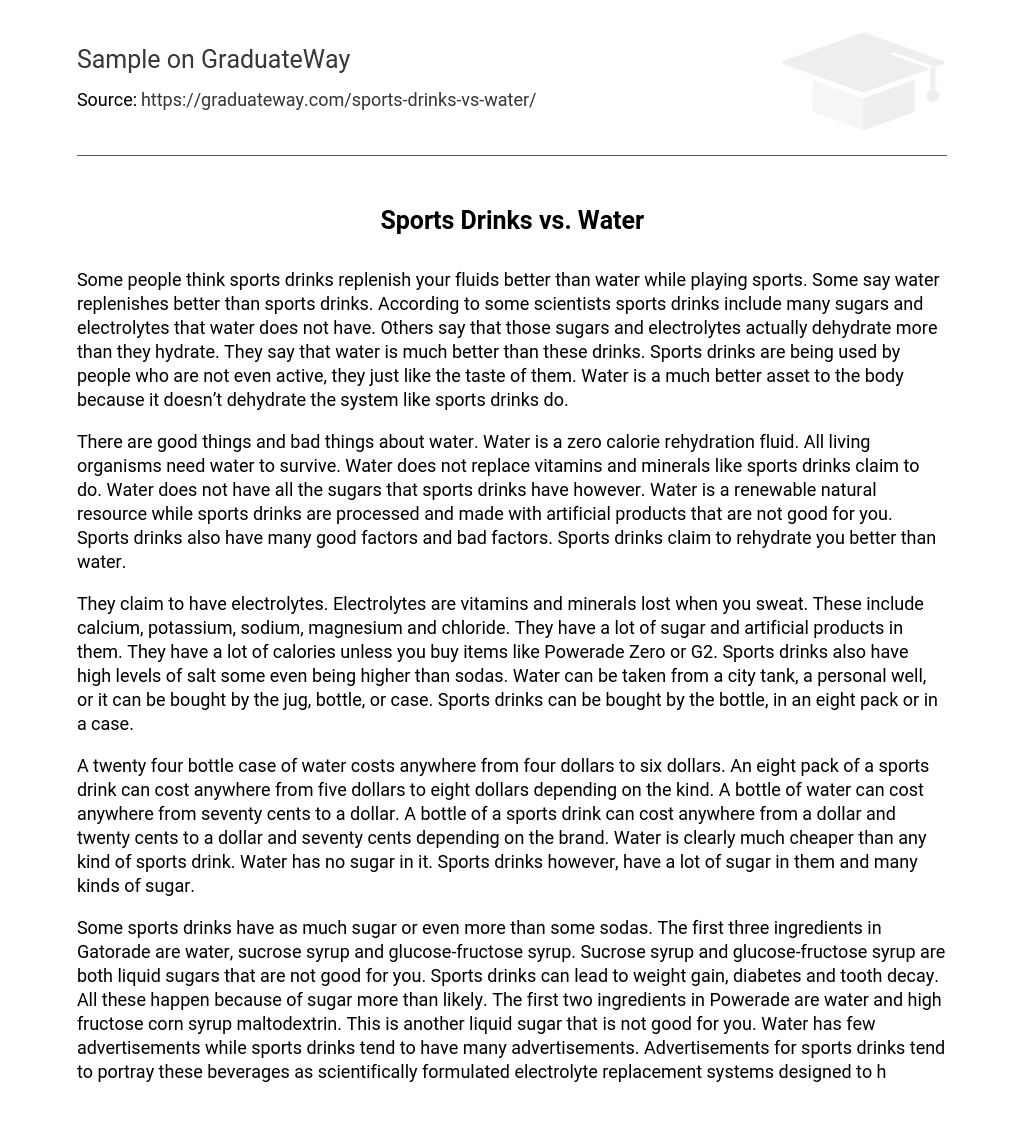There is a debate between individuals on whether sports drinks or water are better for rehydrating the body during sports activities. Some argue that sports drinks, which contain sugars and electrolytes, are more effective. However, others claim that these substances actually contribute to dehydration. On the other hand, advocates for water believe it is superior to sports drinks. It should be noted that some people consume sports drinks solely for their taste even when they are not physically active. In contrast, water provides greater hydration benefits without causing dehydration like sports drinks.
Water has both positive and negative aspects. On the positive side, it is a calorie-free rehydration fluid that is essential for all living organisms. However, water lacks the vitamins, minerals, and sugar found in sports drinks. Additionally, water is a renewable natural resource while sports drinks are made with artificial ingredients that are not beneficial for health. Despite these drawbacks, sports drinks have an advantage over water in terms of their ability to rehydrate the body.
The advertisement promotes electrolytes, which are vitamins and minerals lost through perspiration. These essential nutrients, including calcium, potassium, sodium, magnesium, and chloride, can be found in these drinks. However, they also contain excessive amounts of sugar and artificial ingredients. Unless Powerade Zero or G2 is chosen, these drinks can be high in calories. Additionally, sports drinks generally have higher salt levels compared to sodas.
In contrast to sports drinks, water can be obtained from a municipal tank or a personal well. It is also available in containers such as jugs,bottles or cases.Similarly,sports drinks can also be acquired in bottles,eight-packs or cases.
The cost of a twenty four bottle case of water can range from $4 to $6, while an eight pack of a sports drink can cost anywhere between $5 and $8, depending on the type. The price for individual bottles also varies; water can be priced between 70 cents and $1, while a sports drink bottle can range from $1.20 to $1.70, depending on the brand.
It is evident that water is significantly less expensive than any sports drink option. Furthermore, water has no sugar content unlike sports drinks which contain different types of sugar.
Some sports drinks contain as much or even more sugar than certain sodas. For instance, Gatorade’s top three ingredients are water, sucrose syrup, and glucose-fructose syrup. Both sucrose syrup and glucose-fructose syrup are liquid sugars that can harm your health. The high sugar content in these beverages can lead to weight gain, diabetes, and tooth decay. Powerade, another popular brand, mainly consists of water and high fructose corn syrup maltodextrin which is also an unhealthy liquid sugar. Unlike minimally advertised water, sports drinks are heavily marketed as electrolyte replacement systems specifically designed for rehydrating athletes after physical exertion. Commercials for Gatorade often feature athletes and Olympians to attract more consumers.
Companies pay athletes millions of dollars to promote their products, aiming to convey that these beverages are crucial for a healthy, active lifestyle using “science” combined with advertising imagery and labeling (Keegan). However, a study conducted by independent medical professionals and clinical scientists at Oxford University showed that more than 50% of the advertising claims about sports drinks lack scientific evidence (Avila). Sports drinks can have positive and negative effects on individuals. Over time, the ingredients in energy drinks can lead to addiction and dependency. Moreover, sports drinks have the potential to raise blood pressure and heart rate, which may result in future cardiovascular problems. Additionally, these beverages contain caffeine that constricts blood vessels and causes the heart to work harder when pumping the same volume of blood.
There is an ongoing debate regarding whether sports drinks or water are superior for hydration, with some suggesting that sports drinks can lead to dehydration. It is recommended that if you engage in intense exercise lasting more than sixty minutes, it is advisable to consume a sports drink to replenish lost vitamins and minerals. For exercises under sixty minutes, it is suggested to choose water instead. Sports drinks should not be confused with energy drinks as they serve different purposes. Sports drinks are specifically designed for athletes involved in demanding physical activity, while energy drinks primarily provide stimulation through substances like caffeine and guarana (White). However, non-active individuals may consume sports drinks solely for their taste. Water is considered better than sports drinks as it does not cause dehydration. Additionally, sports drinks are more expensive and contain higher amounts of sugar and calories as well as artificial ingredients. Excessive consumption of liquid sugars can lead to diabetes and heart problems. Critics argue that companies promoting these products are misleading consumers. Ultimately, water remains the preferred choice over sports drinks.
Works Cited
According to Jim Avila’s article “Study: Sports Drink Science Is Self-Serving” on ABC News’ website, research shows that the science behind sports drinks is biased and serves the interests of the industry.
Keegan, Selena. “Sports Drinks Loaded with Liquid Sugars.” Sports Drinks Loaded with Liquid Sugars. N.p., 27 Oct. 2011. Web. 21 Dec. 2012.
According to an article by White, Angel on LIVESTRONG.COM, there is a debate about whether sports drinks can actually cause dehydration. The article was published in June-July 2011 and accessed on December 21, 2012.





